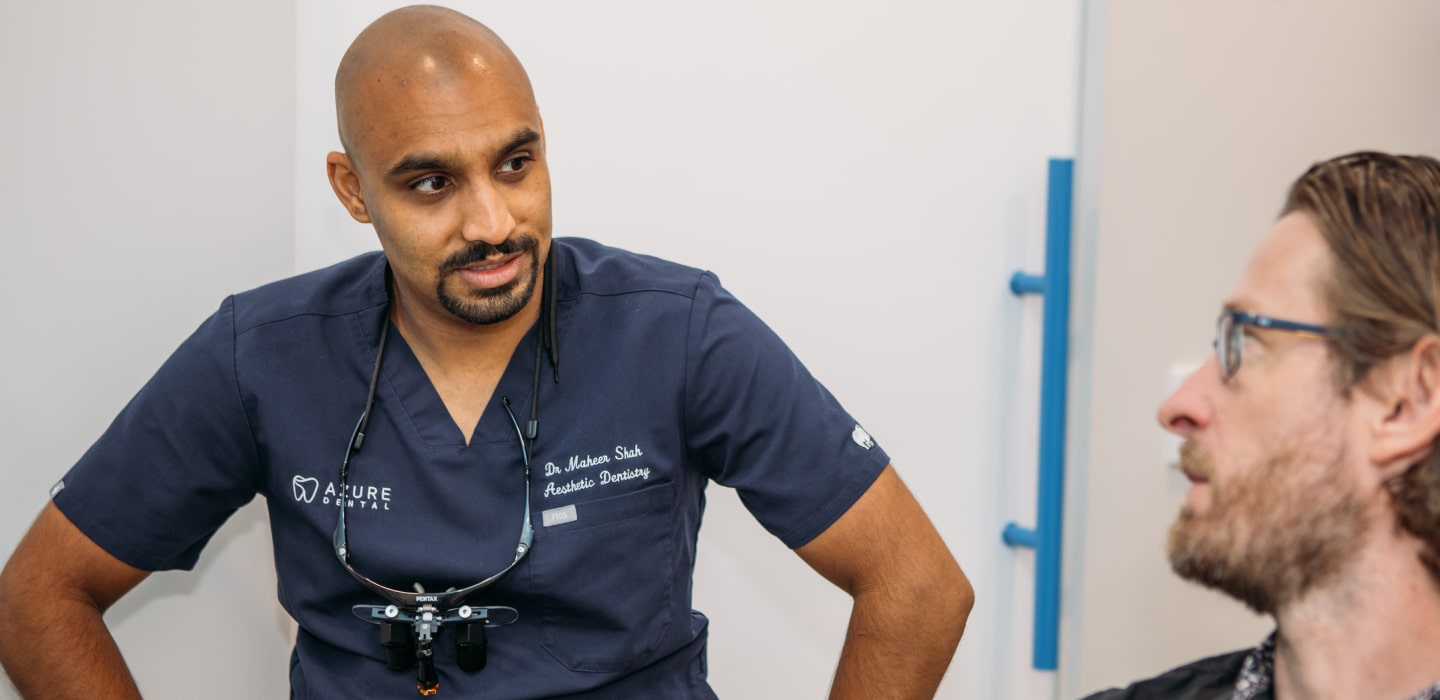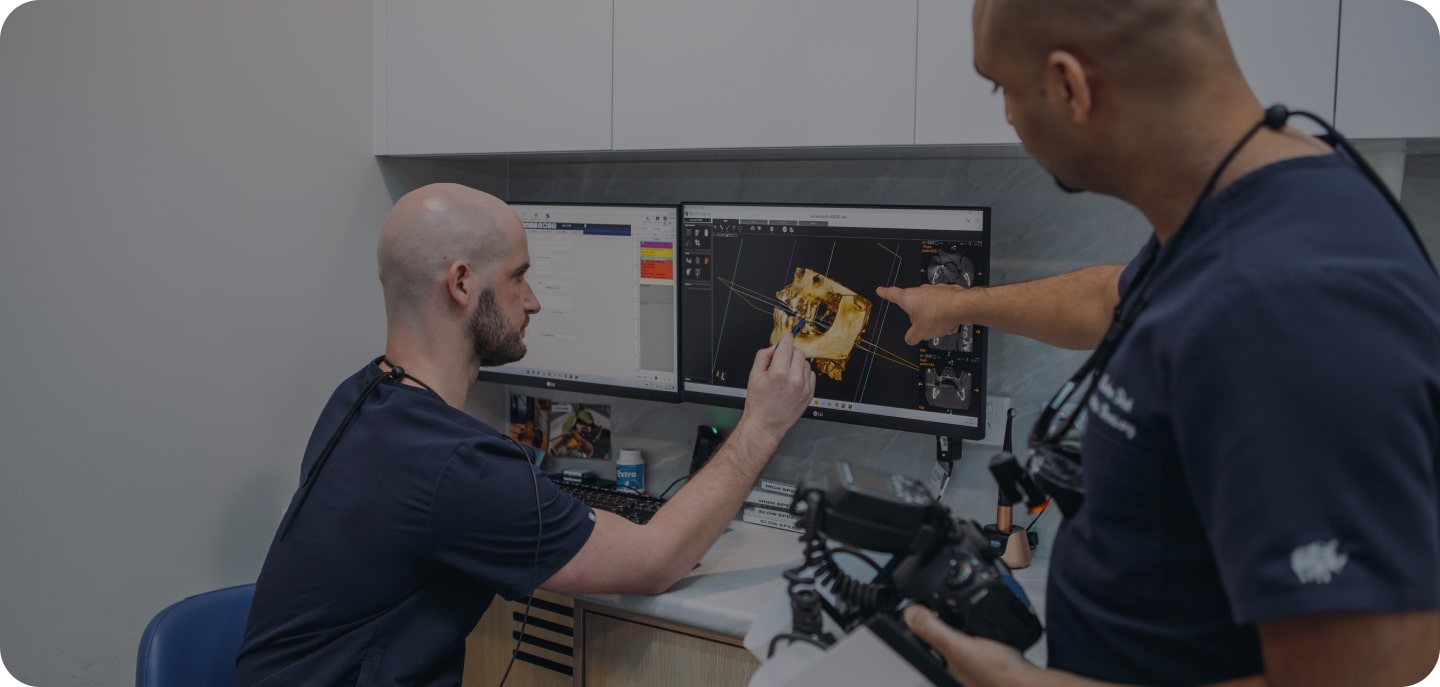Enjoy a Calmer Dental Experience with Sedation and Sleep Dentistry In Inglewood

Why Choose Azure Dental Inglewood for Comprehensive Dental Care
Advanced Dental Technology
We make use of modern tools and equipment for precise, efficient, and high-quality care for all your dental needs.
Experienced Dental Team
Our team combines years of experience with a passion for delivering exceptional care and patient satisfaction.
Personalised Dental Care
We create custom treatment plans to address your specific needs, delivering results that meet your goals.
Dedicated to Community Growth
We share our knowledge within the dental community, fostering growth and continuous improvement in patient care.

A Closer Look At Sedation And Sleep Dentistry For Better Patient Comfort
Many patients face significant anxiety when visiting the dentist, whether due to fear of procedures, a sensitive gag reflex, or concerns about enduring lengthy treatments. These often lead to postponed appointments, affecting long-term oral health.
Our sedation and sleep dentistry in Inglewood can effectively manage these issues. With sedation methods, patients can undergo procedures in a relaxed state, making appointments more comfortable. If you’re looking for a stress-free dental experience, contact Azure Dental Inglewood to discuss your sedation options today!

We provide high-quality dental services in a relaxed, comfortable setting. At our clinic, patient-focused care is at the heart of what we do.

Dr. Sophie
Dentist
Our Sedation And Sleep Dentistry Services At Azure Dental Inglewood
Oral Sedation
By taking a prescribed pill before the appointment, oral sedation provides a deeper, long-lasting calming effect. It's ideal for severely anxious patients undergoing complex treatments.
IV Twilight Sedation
Administered into the bloodstream, IV twilight sedation offers a deeper level of relaxation. This allows patients to stay conscious but comfortably unaware during invasive procedures.
Schedule Your Consultation Today
Experience Exceptional Dental Treatments for a Healthier, Brighter Smile


Identifying the Right Candidate for Sedation and Sleep Dentistry
Sedation and sleep dentistry may be suitable for people with certain dental concerns or conditions. Below are the characteristics that indicate who may be an ideal candidate for sedation dentistry:
- High levels of dental anxiety make routine procedures stressful, requiring sedation to ease treatment.
- Physical restlessness or difficulty staying still due to medical or emotional conditions is a key characteristic of candidates for sedation.
- An exaggerated gag reflex making routine dental procedures difficult indicates the potential benefit of sedation.
- Low pain tolerance, which can result in discomfort during even minor treatments, often requires sedation to manage discomfort effectively.
Discover the Benefits of Sedation and Sleep Dentistry for Patients
Sedation and sleep dentistry offers patients a way to manage anxiety and discomfort during dental procedures. Below are the benefits of sedation dentistry that can make your visit more comfortable:
- Sedation allows patients with severe dental anxiety to undergo necessary treatments comfortably they might otherwise avoid.
- It enhances patient cooperation, making it easier for the dentist to work on detailed procedures without interruptions.
- Sedation reduces the awareness of time, making long procedures feel shorter for the patient.
- It improves the overall experience for patients with physical limitations or medical conditions by helping them remain still and relaxed during treatment.

Patient Reviews
Frequently Asked Questions
What is sedation dentistry, and how does it work?
Sedation dentistry is a medical approach designed to help patients relax during dental procedures. It utilises various sedatives to reduce anxiety and discomfort. These sedatives can be administered in several ways, including orally, intravenously, or through inhalation. Choosing between different sedation options depends on the procedure’s complexity and the patient’s comfort level.
The process works by depressing the central nervous system, allowing patients to feel calm and unbothered by dental activities. While under sedation, patients remain conscious but in a state of deep relaxation. Our sedation and sleep dentistry in Inglewood makes it easier for dentists to work efficiently and reduces patient stress.
What types of sedation are available for dental procedures?
To accommodate various needs and preferences, we offer a comprehensive range of sedation options and sleep dentistry for anxious patients. Below is a detailed discussion of each option:
For those seeking mild to moderate sedation techniques, we offer the following methods:
- Oral Sedation:
This involves taking a sedative pill before the procedure. This reduces anxiety and helps the patient remain calm but conscious and able to interact with the dental team. - IV Sedation:
Administered directly into the bloodstream, IV sedation provides a deeper state of relaxation and can be adjusted by the dentist in real-time.
Choosing the right sedation method can significantly ease the anxiety associated with numerous procedures. Discuss your options with the team at Azure Dental Inglewood to tailor your sedation plan precisely to your comfort levels and medical requirements.
Is sedation dentistry safe for all patients?
Yes, sedation dentistry is safe for most patients when administered by experienced professionals. However, several important considerations need to be assessed to maximise the safety of dental sedation. Here’s an overview:
- Medical history:
Reviewing a patient’s medical history is important. Conditions such as asthma, diabetes, or heart disease may affect the choice and safety of sedation. - Medications:
Current medications should be considered to avoid interactions with sedative agents. Patients should provide a full list of medications they are taking, including over-the-counter drugs and supplements. - Allergies:
Any known allergies, especially to medications, must be disclosed. This helps prevent allergic reactions to sedatives used during dental procedures. - Anxiety levels:
The degree of dental anxiety can also dictate the type of sedation options required. More anxious patients may need a deeper level of sedation to undergo treatment comfortably. - Physical assessment:
Prior to administering sedation, a physical assessment is performed to check vital signs and overall physical health. This confirms that the patient is fit for sedation.
Open communication about these considerations with your dentist at Azure Dental Inglewood can significantly enhance the safety of dental sedation. By addressing these specific factors, your dental team can provide a sedation strategy that aligns with your unique health profile and dental needs.
Are there any risks or side effects associated with dental sedation?
Yes, dental sedation does have associated risks and minimal side effects, though they are manageable. These potential issues vary depending on the type of sedation used and the patient’s health. Here’s an overview of common risks and side effects:
- Nausea and vomiting:
These side effects can occur as a reaction to the types of sedatives used, particularly in IV sedation or general anaesthesia. The body may respond to these drugs as foreign substances, triggering the digestive system to react. - Drowsiness:
Common with all forms of sedation, drowsiness results from the sedative’s suppression of certain areas in the brain responsible for alertness. This can last for hours after the entire procedure as the sedative slowly wears off. - Memory loss:
Sedatives often affect the hippocampus, the area of the brain involved in forming memories. This adverse effect is intentional, helping patients to have fewer memories of the entire procedure to keep them from having a traumatic experience. - Dry mouth:
Sedatives can decrease saliva production by acting on the salivary glands. A dry mouth is often more pronounced with certain oral sedatives and can be uncomfortable but is usually temporary. - Headache:
As the effects of sedation diminish, changes in blood pressure and blood flow can lead to headaches. This is also influenced by dehydration or strain from the entire procedure. - Muscle aches:
Remaining in one position for the duration of a long dental procedure can cause muscle stiffness and aches. Additionally, the relaxation induced by sedatives can lead to unusual postures that create tension in certain muscle groups.
Discussing your medical history and any current medications with your dentist at Azure Dental Inglewood can help mitigate these risks. Understanding these potential side effects equips patients to manage their recovery period better.
Can I drive myself home after receiving sedation?
No, you should not drive yourself home after receiving sedation for an invasive procedure. Sedatives can impair your judgement, coordination, and reaction times, making it unsafe to operate a vehicle. The effects of sedation and sleep dentistry for anxious patients, such as drowsiness and decreased alertness, can last several hours beyond the appointment. It is important to arrange for someone to drive you home for your safety.
How should I prepare for a dental appointment involving sedation?
Preparing for a dental appointment involving sedation is important to facilitate a safe and pleasant experience. Here are the essential steps to prepare for sedation and sleep dentistry for anxious patients:
- Fast before the appointment:
It’s necessary to avoid eating or drinking for about eight hours before sedation to prevent nausea and vomiting during and after the procedure. This reduces the risk of aspiration and helps sedatives work more effectively. - Arrange transportation:
Since sedatives impair your ability to drive, organise a ride home with a friend or family member. This helps you arrive home safely without the risk of driving under the influence of sedation. - Wear comfortable clothing:
Choose loose-fitting, comfortable clothes for your appointment. This provides easy access for any IV sedation and helps maintain your comfort throughout the procedure. - Avoid alcohol and smoking:
Refrain from consuming alcohol or smoking at least 24 hours before your appointment. These substances can interfere with the effectiveness of the sedation and the recovery process. - Medication and health updates:
Inform your dentist about all medications you are taking and any recent changes in your health. This information assists in preventing any adverse interactions with the sedative and allows your dentist to plan accordingly. - Prepare your home for recovery:
Set up a comfortable recovery area at home with essentials like water, painkillers, and comfortable pillows. Having everything within reach helps you relax without needing to move around too much after the procedure.
By diligently preparing for your procedure under sedation at the dental clinic, you can enhance your comfort and reduce potential stress on the day of the procedure. This proactive approach allows you to focus on your recovery and well-being once you return home.
What should I expect during and after a sedated dental appointment?
Here’s what you can expect during the sedated dental appointment:
- Administration of sedative:
Depending on the type of sedation, you might inhale nitrous oxide, take an oral sedative, or receive IV sedation. - Monitoring:
Your vital signs, such as heart rate and blood pressure, will be continuously monitored to maximise the safety of dental sedation. - Reduced awareness:
You will feel relaxed and may have a diminished awareness of the procedure without being unconscious, except under general anaesthesia. - Communication:
Despite sedation, you might still be able to communicate with the dental team if necessary, depending on the sedation level.
After the sedated dental appointment:
- Drowsiness:
Expect to feel sleepy for several hours; the duration depends on the sedation dentistry option and your body’s response. - Accompanied home:
You will need someone to drive you home; operating vehicles or machinery is not advised. - Aftercare instructions:
Your dentist will provide specific aftercare instructions, which may include rest, limited activity, and dietary recommendations. - Temporary amnesia:
You may not remember much from the procedure because of the sedative’s effects on memory. - Side effects:
Some may experience nausea, dry mouth, or headaches as the sedation wears off.
Preparing for what happens during and after sedated dental treatments helps you manage your expectations and recovery more effectively. Keeping informed about each phase of the process allows you to coordinate care and support for a comfortable dental experience throughout.
Do I need someone to accompany me to my sedated dental procedure?
Yes, you do need someone to accompany you to your sedated dental procedure. Sedation affects your alertness and impairs your ability to drive safely. After sedation, your coordination and judgement will be compromised, making it unsafe to operate vehicles or machinery. Having a trusted person with you allows you to get home safely and can assist if any complications arise.